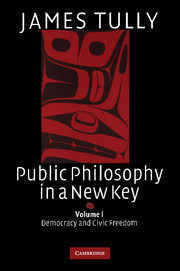Book contents
- Frontmatter
- Contents
- Acknowledgments
- Credits
- INTRODUCTION
- PART 1 APPROACHING PRACTICE
- PART 2 DEMOCRACY AND RECOGNITION
- 4 The agonistic freedom of citizens
- 5 Reimagining belonging in diverse societies
- 6 Multinational democracies: an introductory sketch
- PART 3 INDIGENOUS PEOPLES
- CONCLUSION
- Bibliography
- Index to Volume I
- IDEAS IN CONTEXT
4 - The agonistic freedom of citizens
Published online by Cambridge University Press: 05 September 2012
- Frontmatter
- Contents
- Acknowledgments
- Credits
- INTRODUCTION
- PART 1 APPROACHING PRACTICE
- PART 2 DEMOCRACY AND RECOGNITION
- 4 The agonistic freedom of citizens
- 5 Reimagining belonging in diverse societies
- 6 Multinational democracies: an introductory sketch
- PART 3 INDIGENOUS PEOPLES
- CONCLUSION
- Bibliography
- Index to Volume I
- IDEAS IN CONTEXT
Summary
There is something happening here. What it is ain't exactly clear.
It might feel good, it might sound a little sumpun', but damn the game if it don't mean nothin'.
What is game? Who got game? Where's the game in life behind the game behind the game? I got game.
She's got game. We got game. They got game. He got game.
It might feel good, Or sound a little sumpun', But f – the game if it ain't saying nothin'.
Public Enemy and Stephen Stills, He Got Game‘WHAT IS GAME? WHO GOT GAME?’
In the 1950s Hannah Arendt began to focus on a specific aspect of politics. Instead of looking at the institutions, routines and policies of governance on the one hand, or on the great political theories on the other, she aimed to concentrate on or ‘confront’ the activity of politics itself. In doing this, she drew attention to a specific kind of game-like activity that occasionally emerges in the broader field of politics and government. She associated it with the Greeks and certain moments in the history of Western politics, especially but not exclusively revolutionary times, and claimed that it is the very ‘raison d’être of politics'.
For Arendt, four characteristics of this unique political game are of paramount importance. Firstly, the activity consists in interaction among equal citizens with different viewpoints on their common world and who engage in agonistic activities for recognition and rule in public space.
- Type
- Chapter
- Information
- Public Philosophy in a New Key , pp. 135 - 159Publisher: Cambridge University PressPrint publication year: 2008
- 2
- Cited by

